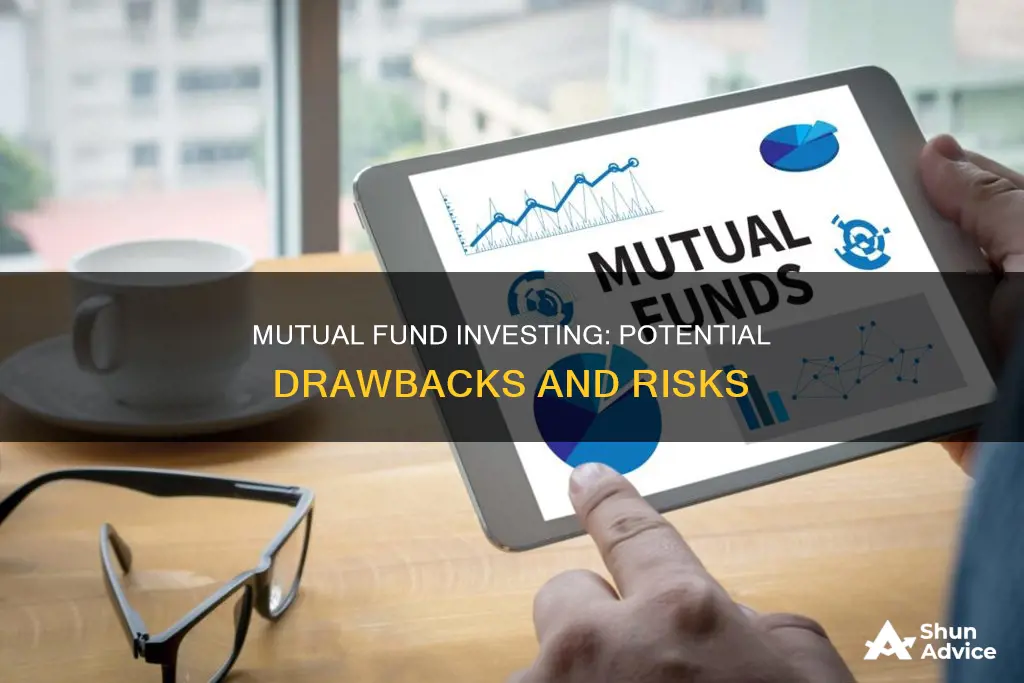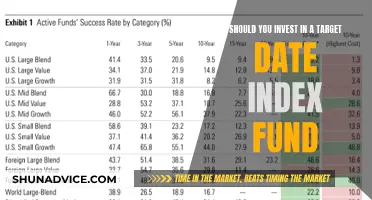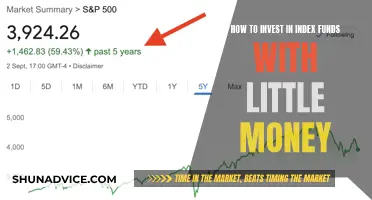
Mutual funds are a popular investment choice, allowing investors to pool their money into a professionally managed investment vehicle. While they offer advantages such as advanced portfolio management, risk reduction, and dividend reinvestment, there are several disadvantages to consider before investing. One key disadvantage is the fees associated with mutual funds, including high expense ratios, sales charges, and management fees, which can significantly impact investment returns. Mutual funds also suffer from tax inefficiencies, as investors have less control over when they pay capital gains taxes. Additionally, the potential for management abuses and poor trade execution are risks that investors should be aware of. Before investing, it is important to research the specific mutual fund, understanding its investment strategy, risks, and associated costs.
| Characteristics | Values |
|---|---|
| High fees | High expense ratios and sales charges |
| Tax inefficiency | Uncontrollable tax events |
| Poor trade execution | Trades only once per day |
| Management abuses | Churning, turnover and window dressing |
| Lack of control | No voting rights |
| Diluted profits | Diversification may dilute profits |
What You'll Learn

High fees and sales commissions
One of the fees to look out for is the expense ratio, which is a percentage of the total assets invested in the fund. Expense ratios above 1.50% are considered high, and investors should be cautious when investing in funds with such ratios. Some funds also charge sales loads or commissions, which can range from 1% to 2% of the total investment. These fees are in addition to any operating expense fees.
It is important to note that higher management fees do not always guarantee better fund performance. In fact, studies have shown that higher fees are often correlated with lower performance. Therefore, investors should carefully consider the fee structure of a mutual fund before investing.
Another cost associated with mutual funds is the exit load, which is a fee charged when an investor redeems their shares. This fee discourages investors from withdrawing their investments for a certain period, acting as an indirect lock-in period. While this helps maintain fund stability, it can also reduce the flexibility of investors to access their funds.
Mutual funds also incur trading costs when buying and selling securities. These transaction fees are typically lower than what an individual investor would pay, as funds benefit from economies of scale. However, these costs can still impact the overall returns of the fund and, by extension, the investors.
In summary, high fees and sales commissions can be a significant disadvantage of investing in mutual funds. Investors should carefully consider the fee structure, including expense ratios, sales loads, operating expenses, and exit loads, before investing in a mutual fund. While mutual funds offer professional management and diversification, the associated fees can eat into profits and impact overall returns.
Vanguard Index Funds: Smart, Secure, Long-Term Investment Options
You may want to see also

Poor trade execution
Mutual fund orders are executed once a day after the market closes, usually at 4 p.m. ET. Buy or sell orders can be made through a brokerage, advisor, or the mutual fund. The settlement period for mutual fund transactions varies from one to three days, depending on the type of fund.
The price paid for the shares purchased or the amount received for the shares redeemed is based on the net asset value (NAV), which is the closing market value of all the combined securities held by the fund minus its liabilities, divided by the fund's total shares outstanding. The NAV is calculated daily after the market closes, and orders are typically posted by 6 p.m. ET.
It is important to note that the NAV may be higher or lower than the previous day's closing NAV. Additionally, investors need to consider the various fees or sales loads associated with mutual funds, such as front loads (commissions), deferred sales charges, transaction fees, and account fees, which can impact the overall cost of investing in mutual funds.
A Guide to Investing in Mutual Funds: Dodgx
You may want to see also

Uncontrollable tax events
Mutual funds are investment companies that invest the collective contributions of their shareholders in numerous securities. Mutual funds distribute payouts to shareholders when they sell securities from their portfolio. These payouts are called distributions and are taxed as income.
Mutual fund distributions are bundled into single, net distributions at the end of each year. These distributions are taxed at either ordinary income rates or capital gains rates, depending on how long the fund held the security. If the fund held the security for less than a year, the distribution is taxed at the ordinary income rate. If the fund held the security for more than a year, the distribution is taxed at the capital gains rate.
The difference in tax rates can significantly impact an investor's tax bill. For example, in 2022, individuals in the highest income tax bracket of 37% were subject to a 20% capital gains tax.
Investors in mutual funds do not have a choice when it comes to capital gains payouts. Due to turnover, redemptions, gains, and losses in security holdings throughout the year, investors typically receive distributions from the fund that are an uncontrollable tax event. This can result in a higher-than-expected tax bill at the end of the year, especially for those in high-tax states.
It is important to note that mutual fund distributions are only taxable if the distributions are paid out in cash or reinvested in additional shares. If the distributions are reinvested, investors must still report the amounts on their tax returns, as the CRA considers the income to have been received before reinvestment.
Additionally, when moving between mutual funds at the same company, these transactions are treated like any other sales and purchases, and taxes must be paid on any gains.
To avoid unexpected taxation, investors should carefully consider the tax implications of mutual fund investments and consult with a tax professional.
Understanding Trust Funds and Investments: A Beginner's Guide
You may want to see also

Lack of liquidity
Liquidity is one of the key advantages of investing in mutual funds. Liquidity refers to the ability to convert an investment into cash quickly and with minimal loss in value. Mutual funds offer relatively high liquidity compared to other investments, such as individual stocks.
When you invest in a mutual fund, you can sell your shares at any time by instructing your broker or financial advisor. Typically, the funds will be returned to your account within a day, which is significantly faster than the time it would take to liquidate individual stocks. This flexibility can be beneficial if you need to access your money unexpectedly or if you want to exit the fund due to poor performance.
However, it is important to note that mutual funds are not as liquid as some other investments, such as exchange-traded funds (ETFs). Mutual funds are traded only once per day after the market closes, whereas ETFs can be traded throughout the day. This means that if you place an order to sell your mutual fund shares, you will receive the closing price for that day, which may be different from the price you expected, especially if the market is volatile.
Additionally, some mutual funds have a "locked-in" clause, which means you are committed to investing for a fixed period, typically 5-7 years. If you try to withdraw your money early, you may be charged a fee or penalty. This is similar to an "exit load" or "back-end load" fee, which some funds charge if you sell your shares before a certain deadline, usually within the first few months of investing. These fees can range from 1% to 3% of the value of the fund's shares.
Furthermore, mutual funds often hold a portion of their assets in cash to facilitate investor redemptions. This cash portion does not earn interest for the fund, which can dilute the overall returns for investors.
In summary, while mutual funds offer relatively high liquidity compared to some other investments, there are still some limitations and potential costs associated with redeeming your shares. It is important to carefully review the terms and conditions of a mutual fund before investing, including any fees, lock-in periods, and the fund's trading frequency.
Open-Ended Mutual Funds: A Guide to Investing
You may want to see also

High capital gains distributions
Mutual funds are required to distribute the majority of their net realized capital gains to investors each year, which can result in large taxable distributions. This is particularly true for actively managed funds, which tend to have higher turnover rates and, consequently, higher capital gains distributions. While this can be advantageous in years when the fund has significant capital losses to offset gains, it can be a burden in years with substantial capital gains.
Additionally, mutual funds may also generate taxable income in the form of dividends, which are distributed to investors. These dividend distributions are often taxable, and investors may be subject to ordinary income tax rates or qualified dividend tax rates, depending on the type of dividend. Therefore, it is essential for investors to consider the potential tax implications of investing in mutual funds and the impact of high capital gains distributions on their overall tax liability.
Furthermore, the timing of capital gains distributions can also impact an investor's tax situation. Mutual funds typically distribute capital gains towards the end of the year, which may not align with an investor's tax planning strategies. For example, if an investor has already realized significant capital gains from other investments, the additional gains from mutual funds could push them into a higher tax bracket. Alternatively, if an investor has capital losses that could be used to offset gains, receiving distributions at the end of the year may limit their ability to utilize those losses effectively.
Overall, high capital gains distributions can be a significant disadvantage of investing in mutual funds, particularly for those in high-tax states or those with complex tax situations. It is crucial for investors to carefully consider the potential tax implications and consult with a tax professional to ensure they understand the full impact of investing in mutual funds on their financial situation.
Pension Funds: Where Your Money is Invested
You may want to see also
Frequently asked questions
There are several disadvantages to investing in mutual funds, including:
- High fees: Mutual funds charge various fees, such as expense ratios, sales charges, and management fees, which can eat into investors' profits over time.
- Tax inefficiency: Investors in mutual funds may face unexpected tax bills at the end of the year due to capital gains distributions, which are taxable events.
- Poor trade execution: Mutual funds are traded only once per day after the market closes, which may result in a different order price than expected for manual orders.
Expense ratios are fees charged by mutual fund companies to cover the cost of running the fund, including administrative costs, marketing, and salaries. These fees are typically quoted as a percentage of the total assets invested in the fund and can range from 0.03% to over 1%.
To avoid high fees, investors should carefully research and compare the fees associated with different mutual funds. Some funds have high expense ratios, sales loads, and commissions, while others are low-cost or no-fee funds. It is also important to be cautious of funds with expense ratios higher than 1.50%, as these are considered high-cost funds.







